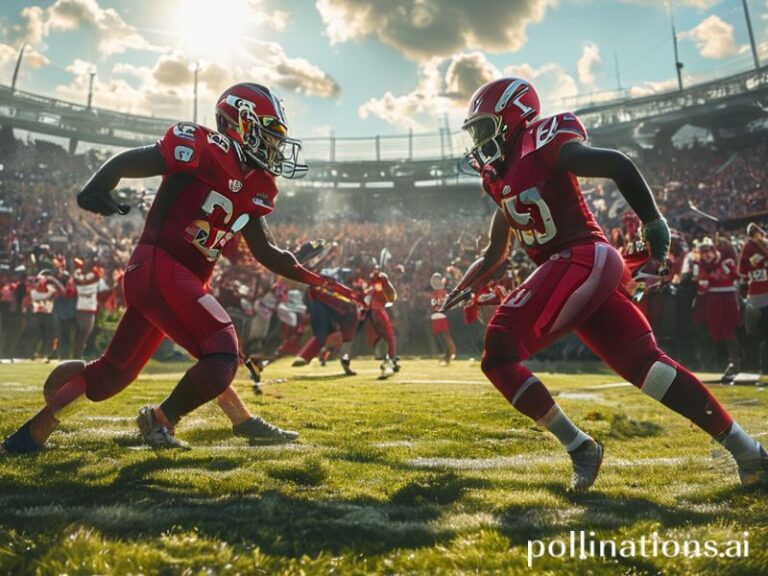Nick Bosa: The 275-Pound Metaphor for Global Chaos
The Geopolitics of a 275-Pound Edge Rusher
How the world’s favorite pastime of watching large men collide became a referendum on everything from trade wars to TikTok
By the time Nick Bosa’s fourth-quarter sack of Dak Prescott ricocheted across European sports-bar screens last January, the play had already been clipped, subtitled in seven languages, and uploaded to a Shanghai server faster than you can say “Section 301 tariff.” The NFL’s official Twitter account—still clinging to that name like a drunk to the last karaoke mic—called it “pure dominance.” In Berlin, a bartender rolled his eyes, muttering that it looked more like the United States practicing unilateral sanctions on an unprotected quarterback.
Welcome to the paradox of Bosa: a man whose day job is to terrorize quarterbacks but whose résumé now doubles as a miniature atlas of our current global neuroses. Born in Florida, raised in the shadow of Facebook’s campus, he is the grandson of a Chicago mob enforcer and the son of a former first-round pick—NFL nepotism so shameless it could teach European royal houses a thing or two. Yet his name trends from Lagos to Lahore not because anyone suddenly discovered the beauty of a Wide-9 technique, but because sport has become the last shared campfire before the batteries die.
Consider the supply chain. Those very cleats that helped Bosa pivot inside a Cowboys tackle were likely stitched in Vietnam, shipped through a port clogged by Red Sea rerouting, and taxed at a U.S. border that changes tariff moods faster than Elon changes baby names. Every Bosa burst off the edge is, in a convoluted way, a triumph of just-in-time logistics over geopolitical entropy. Somewhere, a World Bank economist is updating a regression model with “QB pressures per capita” and wondering if this is what the end-stage of late capitalism looks like—men in tights as moving data points.
Then there is the soft-power angle. When Bosa’s post-game interviews trend on TikTok, the algorithm doesn’t care that his political hashtags lean somewhere to the right of Attila the Hun; it cares that the video loops at exactly the cadence that keeps Indian teenagers from closing the app. In an era when the U.S. State Department struggles to articulate a coherent foreign policy, Bosa’s highlight reels export a simpler message: we still grow humans who can run 4.7 seconds in forty yards while carrying the weight of a midsize refrigerator. Imperial decline has never looked so explosively athletic.
Of course, the rest of the planet gets its own kicks out of the spectacle. In the U.K., Premier League ultras watch Bosa demolish 300-pound linemen and console themselves that at least their sport only ruins knees, not brains—never mind the dementia lawsuits stacking up like Amazon boxes. In Argentina, where inflation makes NFL salaries look modest, sports talk radio debates whether Bosa could transition to rugby if the dollar finally collapses; the consensus is that he’d do fine so long as someone explains the difference between a ruck and a caucus. Meanwhile, Japanese game-show producers are already storyboarding a segment where salarymen in Bosa jerseys attempt to sack cardboard cut-outs of Tom Brady while dodging foam obstacles shaped like semiconductor tariffs.
There is, naturally, the obligatory morality play. Bosa once liked social-media posts your liberal arts roommate would call “problematic,” triggering the now-standard cycle of outrage, apology, and redemption arc sponsored by a hydration drink that tastes like melted Jolly Ranchers. The international audience watches this Kabuki with the detached fascination of people whose own governments disappear dissidents but still manage to lecture Americans on Twitter etiquette. Schadenfreude, after all, is the one export the EU never needs to regulate.
So what does it mean, this global fixation on a 25-year-old edge rusher who speaks in monosyllables and earns more per game than most Moldovan villages see in a year? Perhaps only that in a fractured world, we still crave uncomplicated narratives: good versus evil, offense versus defense, the crisp geometry of a well-timed blitz. We need our avatars of controlled violence because the uncontrolled kind keeps leaking into the headlines. And if the price of that illusion is pretending that a strip-sack can, for one flickering second, rebalance trade deficits and soothe algorithmic rage—well, slap on the non-fungible jersey and cue the national anthem. The show must go on, right up until the power grid fails and the only remaining highlight reel is the Northern Lights.
Until then, keep an eye on Nick Bosa. Somewhere in Brussels, a Eurocrat is already drafting a regulation to tax his highlight reels as carbon-intensive entertainment. And in a dimly lit apartment outside Lagos, a teenager refreshes YouTube, waiting for the next clip that proves the empire still has some burst left in its step.







